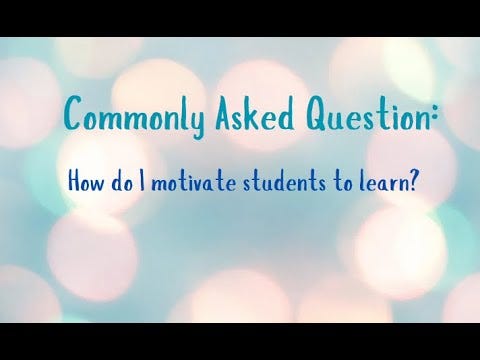This is the third in my Commonly Asked Questions series. If you have a question you’d like me to reframe and answer, leave it in the comments and I’ll give it a run!
Reframe
“How do I help my students (re)discover themselves as capable, confident learners? How do I model joyful learning and curiosity for them?”
Why reframe the question?
This question is fascinating and tricky! I think this question, in its broadest sense, isn’t precisely about motivation, or at least not all the time. Humans are hard-wired to learn and, on some level, we’re learning and trying to make meaning of things all the time. But this question arises when teachers needing or wanting students to engage and they don’t, or won’t, often with no explanation. Teachers get frustrated, blame the student’s motivation, and that can eventually lead to giving up on the student.
I think better questions try to get at what people believe about themselves as learners, or what kinds of experiences they’ve had with learning. You may not be able to get the student to tell you much about either of these things, which is why the question of motivation can be quite frustrating. But when you reframe the question, even if you only ask it inside your head, it changes your approach with students.
Most of us have been in the position of teaching stuff people don’t seem to care about. We’ve also been the student in a class that doesn’t hold our attention. Sometimes, the teacher may not be doing a great job. But more often, I think it is a result of an inflexible system hasn’t figured out how to adapt to our rapidly changing world, and the pressure it puts on teachers to simply dump content and proctor tests.
In this system, what students are supposed to learn may or may not be something that is relevant to their lives, and teachers have little time for curiosity, exploration, and meaning-making. In part, this is because what students may want to explore is nowhere near what teachers are supposed to teach! How do you explain that it’s ok to be curious about *this* thing but not *that* thing? And if you’re curious about *that* thing, sorry, but I don’t have time for you to indulge yourself in my class.
Public curiosity is a fragile thing. Asking questions about something signals interest and may require some vulnerability, at that means taking a risk. Most of us learn early that asking questions in class can make you a target of other students, or a target of the teacher. Either way, we’re looking at a fast track to feeling embarrassed and ashamed for being interested, and that can result in educational trauma.
Being shamed for expressing curiosity may shut down our desire to learn, or at least express that desire in public spaces, and that brings us back around to the question of motivation. It’s possible the student isn’t motivated, but I recommend putting that whole question to the side, as it doesn’t get us anywhere. Instead, I ask where I’ve seen this student show interest before, where they have had success – even something very small – and try to remind them of those moments.
Help them remember that that they’ve enjoyed learning at least one time before, and they have had moments of accomplishment. Celebrate those moments with them, remind them that learning can be a joyful endeavor, and that you want to share that joy with them.
Article series
Commonly Asked Questions (CAQ) Overview
Commonly Asked Questions #2: How do I get students to engage with uncomfortable topics?




